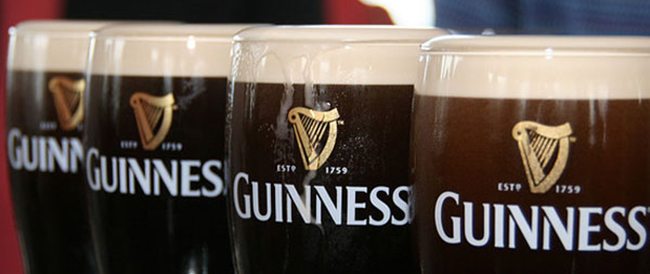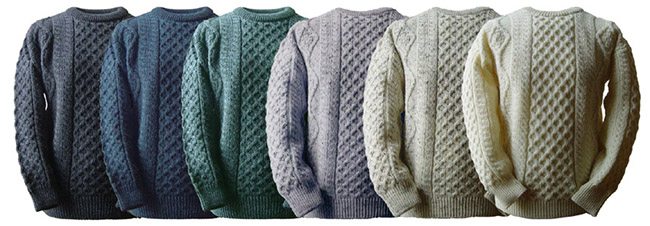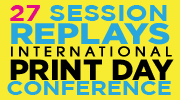
I am getting ready to pack-up and head-off to #DscoopOpen in Dublin with Team HP High-Speed Production Inkjet next week, so thought I would do a little research since I have never been. Turns out the accent might not be the only thing I don’t understand!
Irish Central was kind enough to put together this handy list of phrases and sayings everyone should know before they visit Ireland, and I am happy to share them with you. Normally I would just send you over to read, but they have so many pop-ups on their site, it’s much more civilized this way – especially if you are reading from a mobile device!
If any of these are “arseways” or outdated, my apologies… and let me know “Was it any use?” <– I’m practicing! There will be a #printPOPquiz in Dublin so please find me and let’s have some o’fun! And if you are staying home, follow #DscoopOpen on Twitter and watch out for #PrintChat Live with the Leprechauns from Dublin on June 3rd!!

35 Irish sayings and phrases you need to learn before you visit – by Mark Farrelly
“Sure look it”
Rule number one for speaking like an Irish person: ‘Aw sure look it’ is an acceptable response for any question, statement, or comment. What does it mean? God only knows! But if ever you find yourself in a situation where you’re not sure what to say, just go ‘sure look it’ and you’ll fit in just fine.
In use: “Isn’t it lovely weather we’re having?” “Aw sure look it.”
“A whale of a time”
Hopefully this is what you’ll have when you come ove. It’s simply an expression of how good a time someone has had – usually used after a night out.
In use: “The bar didn’t close till half three, and Micky got up and sang with the band. Sure we had a whale of a time!”
“The Jacks”
If you arrive in Ireland and ask someone for the rest room, it is social suicide. It’s either called “the toilet,” or even more commonly “the jacks.” In pubs the sexes are written in Irish on toilet doors. So you have the “fir jacks” and the “ban jacks.” Not to be confused with “banjaxed,” which means something is broken. You’ll learn soon enough.
In use: “Tell ye what, you get in another round, while I head to the jacks.”
“Go way outta that”
This has a few meanings. It can be an exclamation of disbelief, or a standard response when someone pays a compliment to you (we don’t really know how to take compliments in Ireland). However the time you’ll hear it said is probably when someone means “don’t be silly,” or “it’s no trouble.”
In use: “You’ll have a brandy?” “No thanks, don’t be troubling yourself.” “Ah go way outta that, of course ye will!”
“Arseways”
To do something the wrong way, for something to go wrong on you.
In use: “We tried to roast the turkey but it went arseways on us.”
“Was it any use?”
Simply means “was it any good?” It’s a common saying everywhere, and if you’re heading to any events you can consider it a guarantee that an Irish person will ask you this question afterwards.
In use: “We headed into town for a few last night.” “Was it any use?”

“Donkey’s years”
Used as a reference of time. We have absolutely no idea what the length of time a donkey’s year is, but it’s widely accepted that it’s a very very long time.
In use: “You’re all very welcome to Lisnabuntry, we haven’t had this big a crowd here in donkey’s years.”
“Quare”
This is fairly common around the south of Ireland. It’s an odd pronunciation of “queer,” but it’s used as a replacement for “very.”
In use: “Jaysis it’s quare warm today isn’t it?”
“Happy out”
Just means “happy,” but for some reason we feel the need to add “out.” It’s usually used in the present, so basically while you’re in the process of having a whale of a time, you’re happy out.
In use: “Look at you there, happy out leaping about the place.”
“Put the heart crossways” in someone
To give someone a fright. This is what you’ll do when you’re staying with an Irish friend or relative and you accidentally walk in on them in the shower.
In use: “Jaysis you put the heart crossway in me, I didn’t see you there at all!”
“The press”
A press is what we all a cupboard in Ireland. However, the “hotpress” … Well that’s a different matter altogether!
In use: “Hold on now till I get the biscuits from the press.”
“Wrecked”
If you’re very tired. Normally used after a big night out.
In use: “We were out last night until half six this mornin’. I’m wrecked now though.”
“The guards”
If you think you know all the lingo before you come over to Ireland by learning the police are called the Gardai, and that a policeman is called a Garda, you’re in for a big surprise. We don’t called them that at all in everyday conversation, we just call them guards.
In use: “We may turn down music down, and tell John to get off the roof! The neighbours will have the guards on us any minute.”

“Wet the tea”
There’s a lot of phraseology around tea. Most importantly, if anyone asks you to wet the tea they’re telling you to throw a few teabags in the teapot and pour boiling water in.
In use: “Sit down there and relax while I go wet the tea.”
“Like hen’s teeth”
Derived from the original phrase “as rare as hen’s teeth,” but has been shortened over the years. Pretty much means something is rare. Have you ever seen teeth in a hen? Me neither.
In use: “Ah sure we used to have lots of eligible bachelors rounds these parts, but they’re like hen’s teeth now.”
“Diesel” and “petrol”
If you rent a car when you’re visiting Ireland and you need to refuel, you needn’t go looking for “gas,” which is something else all together and entirely unrelated to driving or flatulence! You have to find out whether the car is “diesel” or “petrol” and fill it with that. Not with green diesel, mind you. That last thing you want is to get dipped by the guards.
In use: “Give me €20 worth of petrol, please.”
“The boot”
This is what we call the trunk of in a car. So if you’re heading on a day out and your great aunt tells you to “throw everything into the boot,” you know exactly what she means!
In use: “Is anyone able to come help me bring in the shopping from the boot?”
“Minerals”
This is what we call soft drinks. Beware if you’re visiting old people: they’ll automatically assume you love a mineral called 7Up and will force feed you with it.
In use: “You can’t drink because you driving? Well sure you’ll have a mineral instead!”

“Pint of Gat”
A “pint of Gat” is another name for Guinness. On that note, when drinking Guinness, look towards the horizon so you don’t drink the head. And if someone asks if it’s good Gat, and you’re not sure how to judge it, simply respond with “sure look it.”
In use: “Give me two pints of Gat and a bottle of Bulmers.”
“Ossified”
Very drunk. What you’ll end up after too many pints of Gat.
In use: “Lord God you were fairly ossified last night weren’t you?”
“Chips”
In Ireland, chips are crisps and French fries are chips. Be warned you will fall in love with a delicacy called “curry cheese chips” some night when you’re ossified.
In use: “Here love, fancy a bag’a chips?”
“The fear”
The fear is what you will have the morning after you were ossified, and ate said curry cheese chip. Also called “the beer blues,” “drinker’s remorse,” and “the chronics” – it sums up how you feel when you can’t remember large chunks of the night before. Other symptoms include unexplained depression, cuts and bruises, and not being able to find your shoes. Why do we do it to ourselves?!
In use: “I’m afraid to show my face in there again. I’m crippled with the fear.”
“I will yea”
This can get very confusing. “I will yea” means “I definitely won’t,” it’s just an easier way of saying it. We’re big into our sarcasm here, and if you get flustered by it, don’t worry. You won’t be the first and definitely won’t be the last.
In use: “Are you getting up for mass in the morning? I will yea!”
“Beyont”
Beyont is an all encompassing word for any place that isn’t the place you’re in at the moment. It can refer to the other end of the room, or to the other side of the world.
Expect to hear a lot of country people question you about stuff you have at home, and they’ll use the word beyont when doing it.
In use: “Would you have much rain beyont?”
“I’m gunna head on”
There are two phrases for the price of one here. There’s “head on,” which means you’re going to leave, and “head,” which simply means “go.” So if someone asks you will you head somewhere, you’ll now know what they’re actually asking.
In use: “There’s two lads shouting at each other in the chipper. I’m gunna head on before a fight breaks out.”
“Naggins” and “shoulders”
Naggins and shoulders refer to the sizes of bottles of spirits. A shoulder will get you a good way to being to being happy out, but a naggin is perfect for smuggling (or “gooching”) into a pub. However, we’re not endorsing such scurrilous actions.
In use: “Get me a shoulder of Captain Morgan, and Aisling wants a naggin of vodka.”
“Fierce weather”
All weather is “fierce.” It can be fierce wet, fierce cold, fierce mild, fierce dry, fierce windy, fierce drizzly, fierce warm, fierce frosty, fierce breezy, fierce damp, fierce humid, fierce dead. Fierce everything, basically. Actually, on that note, if someone tells you it’s a dead day they mean the weather is humid and would make you sleepy.
In use: “How are you? God it’s fierce weather we’ve been having the last few days.”

“A jumper”
Sweaters, or pullovers, are called jumpers in Ireland. It’s an absolute guarantee that Irish mammies will insist you put a jumper on if you’re heading out anywhere.
In use: “Make sure and bring a jumper with you. It’s fierce weather out there.”
“That dose is going’ round”
Don’t say they didn’t warn you! If you didn’t wear your jumper, you probably caught a cold. But don’t worry, someone will reassure you that “that dose is goin’ round,” meaning everyone else has the same illness. I’m not sure why that’s meant to make you feel any better though.
In use: “Brendan’s in bed with the flu, he won’t make the festival.” “Oh God help him, but sure that dose is goin’ round.
“A shuck”
A shuck is big ditch that runs along the bottom of fields. If they’re not cleaned out regularly, grass, briars, and nettles can grow up and you mightn’t even see the shuck. So if you’re planning any Sound of Music-esque frolics through the fields, beware you don’t fall in.
In use: “Come quick, the tractor go out of control on Patsy and now he’s below, stuck in the shuck.”
“Do the washing”
Obviously, if you’re planning a long stay in Ireland, your clothes are going to have to be washed at some stage. Note that instead of doing “laundry,” we do “the washing.” This is all weather related too, and if you’re staying with an Irish mammy she’ll constantly talk about doing the washing.
In use: “There’s great drying today, so I got up at half six to do the washing and get it out on the line nice and early.”
“The messages”
You will hear about people going out to do the messages, or going into town for the messages. Alas, middle-aged Irish women are not part of some secret government organisation; they’re just referring to the shopping. The messages are what some Irish people call the groceries.
In use: “Anyone want anything I’m heading into town to do the messages.”
“Call round for a céilí”
A céilí, as we all know, is globally thought of as a session of trad music and dancing, but it also can simply mean calling round to someone’s house for a chat and a cup of tea. The phrase is beginning to die out, but that doesn’t mean we can’t bring it back!
In use: “Are you doing anything Friday? Sure I might call round for a céilí.”
“That’s a fret”
“That’s a fret” is an expression of disbelief. Usually said in a calm way, though. Use it when something’s surprising but at the same time not beyond the realms of possibility.
In use: “Thirty-five phrases I need to learn before coming to Ireland? That’s a fret!”











